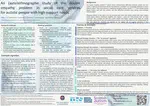Understanding the autistic social communication style (PhD)
Several recent studies have suggested that autistic people may communicate better with other autistic people than with non-autistic people. This suggests that there may be an autistic communication ‘style’, and that part of autistic communication difficulties is the mismatch between this style and non-autistic people’s style. However, we don’t currently know much about what this autistic communication style might look like. My PhD aims to improve our knowledge in this area, and use it to improve communication difficulties between autistic and non-autistic people.
My PhD consists of four studies. Studies 1 & 2 are two online focus groups with a small number of autistic adults, asking them about their experiences with socialising and communicating with other autistic adults vs. non-autistic adults. Study 3 is analysis of an existing dataset, looking at how well autistic and non-autistic observers can guess whether people in various social contexts (two autistic people interacting; two non-autistic people interacting; an autistic and a non-autistic person interacting) are autistic or not, from photographs and videos. Study 4 is an ethnographic study of autistic adults with high support needs, and their interactions with one another and (primarily non-autistic) staff in day support services. I am also producing some theory work that builds on Dr. Milton’s double empathy problem, focusing on why interactions between autistic and non-autistic people seem to be so difficult for both parties.
Understanding how autistic people communicate could help improve communication between autistic and non-autistic people, by providing ways for non-autistic people to adapt their communication to better suit autistic friends, family, and colleagues, or autistic people they work with professionally. The work with Scottish Autism, specifically, should have benefits for the autistic people who use their services by suggesting ways to improve communication between staff and supported people.
At the University of Edinburgh, September 2020 to December 2024. Supervised by Dr. Sue Fletcher-Watson, Dr. Catherine J. Crompton, and Dr. Joseph Long. Funded by Medical Research Scotland (PhD-50092-2019) and Scottish Autism.














